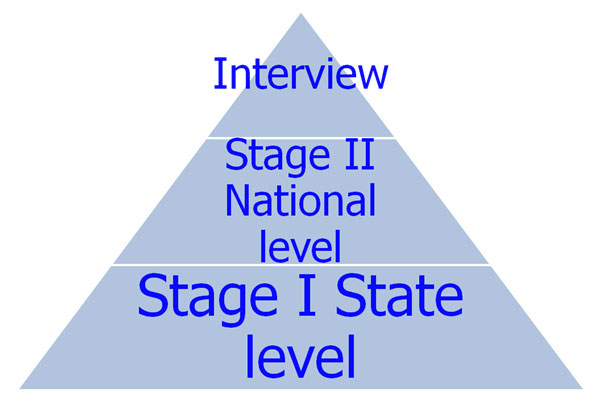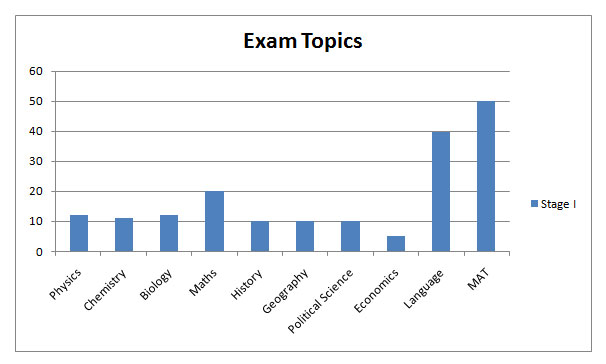National Talent Search Examination (NTSE) 2013-14
The National Talent Search Examination (NTSE) is a national level scholarship program in India to identify and nurture talented students. It honours and helps talented students by providing financial assistance in the form of a monthly scholarship for a entire academic career. It is open to student of Indian National only. Students studying in class X standard are eligible to appear for the selection process.

There is a two-stage selection process for award of scholarship. For Stage I, selection will be done by States/UTs through the written examination. Stage I exam takes place on 17th November 2013. Each State/Union Territory has been allotted a quota to recommend a specific number of candidates for the Stage II examination. Students who qualify Stage I will be eligible to appear for Stage II examination conducted by NCERT. Stage II exam is conducted each year in the 11th May 2014 for about 3000 candidates.
Scholarships: On the basis of the examination conducted, 1000 scholarships will be awarded for each group of students appearing for Class X examinations. The amount of scholarship will be Rs.500/- per month as per NTS rules except for Ph.D., wherein it is paid according to UGC norms. For the courses in Basic Sciences, Social Sciences and Commerce, this assistance is provided up to Ph.D. level. For professional courses like Engineering, Medicine, Management and Law this assistance is given only up to Post Graduation.
Eligibility: All students of Class X studying in recognized schools are eligible to appear for the Stage -I examination, conducted by the States/UTs, in which the schools are located. There will be no domicile restriction.
Eligibility: All students of Class X studying in recognized schools are eligible to appear for the Stage -I examination, conducted by the States/UTs, in which the schools are located. There will be no domicile restriction.
Reservation: 15% scholarships will be reserved for students belonging to the SC category, 7.5% scholarships for students belonging to the ST category and 3% for Physically Challenged Group of Students each in respect of the class X. This reservation is according to the Madhya Pradesh rule book.
State Quotas: Each State/Union Territory has been allotted a quota to recommend a specific number of candidates for the Stage II examination, the details of which will be made available on NCERT website. However, there will be no State/Union Territory Quota for the final award of scholarship after the Stage II examination. Madhya Pradesh quota for this year is 262.
Application Form: You may contact the State/UT Liaison officer for procuring application form. However, application form can be downloaded from NCERT website also. All correspondence relating to application forms should be addressed to the State Liaison Officers (LOs) whose addresses are given at the end/Website. The completed application form duly signed by Principal of the school should be submitted to the LO/ concerned district official of the State before the last date.
Fees: States and Union Territories may notify the fee required (refer NCERT website) which will be paid for the Stage-I examination. However, NCERT does not charge any fee for the Stage-II examination.
Procedure for Applying: Applicant should fill up the hard copy of the form. This form should then be attested by the principal of the respective school. Then applicant is required to do the online entry of the form at the MP Online Kiosk. Thereafter, he/she will get 2 copies of the receipt. One receipt need to be kept by him/her. Other receipt is to be attached with the application form and sent to the following address-
Commissioner (NTSE)
Rajya Shiksha Kendra
Pustak Bhawan, B-Wing Arera Hills
Bhopal - 462 011
Announcement of Results: Results of the Stage-I examination will be announced by the respective State Governments/ Union Territories. Results of Stage-II examination will be announced by NCERT.
Online Application Form Start Date |
August 23, 2013 |
Online Application Form End Date |
September 23, 2013 |
Exam Date and Day |
November 17, 2013 (Sunday) |
Exam Fee |
No fees. |
Exam Time |
11 am to 2.30 pm |
Examination: The exam will be objective type (MCQ). There is no negative marking. The pattern of written examination will be as follows:
- Stage I examination at the State/UT level will comprise of two parts, namely (a) Mental Ability Test (MAT) and (b) Scholastic Aptitude Test (SAT), which also includes Language Comprehensive Test.
- Stage II examination at the National level will comprise of (a) Mental Ability Test (MAT), (b) Scholastic Aptitude Test (SAT), which also includes Language Comprehensive Test.
NTSE Stage 1
Duration of 1 test (SAT + MAT): 180 minutes
Paper |
Subject |
No. of |
Marks Allocation |
Time Limit (mins) |
Minimum Qualifying Marks |
|
|
Unreserved |
Reserved |
||||
SAT (Scholastic Aptitude |
Mathematics |
20 |
20 |
90 |
40% or 52 marks |
32% or 42 marks |
Physics |
12 |
12 |
||||
Chemistry |
11 |
11 |
||||
Biology |
12 |
12 |
||||
History |
10 |
10 |
||||
Geography |
10 |
10 |
||||
Political Science |
10 |
10 |
||||
Economics |
5 |
5 |
||||
Language Test |
40 |
40 |
45 |
|||
MAT (Mental Abilty Test) |
Mental Ability |
50 |
50 |
45 |
40% or 20 marks |
32% or 16 marks |
Total |
180 |
180 |
|
|
|
|
NTSE Stage 2
Duration of 1 test (SAT + MAT): 180 minutes
Paper |
Subject |
No. of |
Marks Allocation |
Time limit |
SAT (Scholastic Aptitude Test) |
Mathematics, Science, Social Studies |
100 |
100 |
90 |
Language Test (English or Hindi) |
50 |
50 |
45 |
|
MAT (Mental Abilty Test) |
Mental Ability |
50 |
50 |
45 |
Total |
200 |
200 |
180 |
|

Syllabus
There is no prescribed syllabus for the NTSE examination. However, the standard of items conforms to the level of CBSE and other Boards of Class IX and X Public Examinations.
Physics
- Light
- Magnetism
- Electricity
- Measurement
- Pressure & Friction
- Sound
- Sources of Energy
- Work and energy
- Motion and Force
- Heat
- The Universe
- Rain, Thunder & Lightning
Chemistry
- Acid Bases and Salt
- Air
- Carbon- A Special Element
- Classification of Materials
- Fibers and Plastics
- Metals & Non Metals
- Physical and Chemical Changes
- Pollution
- Structure of Atom
- Water
- Combustion & flame
- Coal & Petroleum
Biology
- Some Common Diseases
- Plant and Animal Nutrition
- Human Body
- Life & Environment
- Food Production & Management
- Habitat
- Cellular Level of Organization
- Micro-organisms
- Endocrine System
- Adaptation
- Reproduction in Plants and Animals
- Soil
- Respiration
Mathematics
- Algebraic Expressions
- Arithmetic
- Data Handling
- Direct & inverse variation
- Exponent
- Introduction of graph
- Linear Equation
- Menstruation
- Number System
- Percentage & its Application
- Playing with numbers
- Rational Numbers
- Simple interest & Compound interest
- Square Root & Cube Root
- Statistics
- Trigonometry
- Understanding Geometrical Shapes
History
- Culture, Science and Literature
- Early Medieval Period
- Indus Valley Civilization
- Introduction and Sources of Ancient Indian History
- Jainism, Buddhism and Conquerors from Distant Lands
- Medieval Architecture and Culture
- National Movement
- New Empires and Kingdoms
- Popular Movements and Social Reforms
- Revolt of 1857
- The Mauryas
- The Mughal Empire
- Vedic Period
Geography
- Agriculture
- Atmosphere
- Industries
- Internal Structure of the Earth and Rocks
- Major Domains and Landforms
- Maps and Globe
- Motion of the Earth
- Natural Vegetation
- India
- Environment- wildlife, vegetation
- Natural Resources and Development
- Solar System
Political Science
- Democracy
- Diversity and Livelihood
- India and its Neighbours
- Indian Constitution
- Union, State and Local Government
- The Judiciary
- UN and International Agencies
Economics
- awareness of current systems of economies
- type of banks
- bank deposits
- role of banks in the system.
Mental Ability
- Alphabet Test
- Analogy (Non Verbal)
- Analogy (Verbal)
- Blood Relations
- Calendar, Time and Clock
- Classification
- Coding-Decoding
- Cube and Dice
- Direction Sense
- Embedded Figure
- Figure Partition and Dot Situation
- Mathematical Operations
- Missing Character
- Number and Ranking
- Paper Folding and Cutting
- Series (Non - Verbal)
- Series (Verbal)
- Venn Diagrams
- Water and Mirror Images
- Word Problems
General awareness
- recent happenings
- political events at National and International scale
- awards
- sports
Interview
- There can be 4-6 teachers in the Interview board.
- Interview Duration: 10 - 20 minutes. In some case it can extends to 30/40 minutes as well. But the duration is not directly related with the marks!
- Normally the first question is : Tell me about yourself
- They can ask in details about your hobbies
- Anything related to your course book can be asked
- About your School, your favourite teacher, favourite subject, player and Why?
- About your parents.
- Never try to pretend and be truthful.
- What you want to be and why?
- They will see if you are tensed or not. Try to remain calm. If you don’t know questions, simply say "sorry". If putting any guess then tell them that "I feel" Something like that.
- Interview is not English test.
- They will try to check your creativity and thinking capability by asking questions based on applications of various physics or chemistry concepts, puzzles, math problems etc.
- Wear a simple dress.
